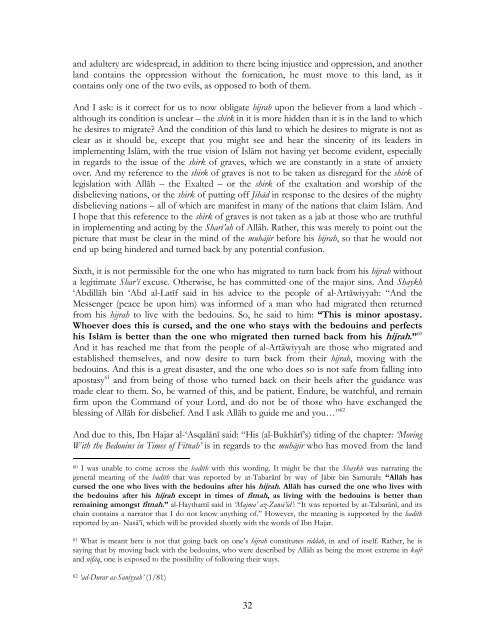hijrah-obligation2
hijrah-obligation2
hijrah-obligation2
You also want an ePaper? Increase the reach of your titles
YUMPU automatically turns print PDFs into web optimized ePapers that Google loves.
and adultery are widespread, in addition to there being injustice and oppression, and anotherland contains the oppression without the fornication, he must move to this land, as itcontains only one of the two evils, as opposed to both of them.And I ask: is it correct for us to now obligate <strong>hijrah</strong> upon the believer from a land which -although its condition is unclear – the shirk in it is more hidden than it is in the land to whichhe desires to migrate? And the condition of this land to which he desires to migrate is not asclear as it should be, except that you might see and hear the sincerity of its leaders inimplementing Islām, with the true vision of Islām not having yet become evident, especiallyin regards to the issue of the shirk of graves, which we are constantly in a state of anxietyover. And my reference to the shirk of graves is not to be taken as disregard for the shirk oflegislation with Allāh – the Exalted – or the shirk of the exaltation and worship of thedisbelieving nations, or the shirk of putting off Jihād in response to the desires of the mightydisbelieving nations – all of which are manifest in many of the nations that claim Islām. AndI hope that this reference to the shirk of graves is not taken as a jab at those who are truthfulin implementing and acting by the Sharī’ah of Allāh. Rather, this was merely to point out thepicture that must be clear in the mind of the muhājir before his <strong>hijrah</strong>, so that he would notend up being hindered and turned back by any potential confusion.Sixth, it is not permissible for the one who has migrated to turn back from his <strong>hijrah</strong> withouta legitimate Shar’ī excuse. Otherwise, he has committed one of the major sins. And Shaykh‘Abdillāh bin ‘Abd al-Latīf said in his advice to the people of al-Artāwiyyah: “And theMessenger (peace be upon him) was informed of a man who had migrated then returnedfrom his <strong>hijrah</strong> to live with the bedouins. So, he said to him: “This is minor apostasy.Whoever does this is cursed, and the one who stays with the bedouins and perfectshis Islām is better than the one who migrated then turned back from his <strong>hijrah</strong>.” 60And it has reached me that from the people of al-Artāwiyyah are those who migrated andestablished themselves, and now desire to turn back from their <strong>hijrah</strong>, moving with thebedouins. And this is a great disaster, and the one who does so is not safe from falling intoapostasy 61 and from being of those who turned back on their heels after the guidance wasmade clear to them. So, be warned of this, and be patient. Endure, be watchful, and remainfirm upon the Command of your Lord, and do not be of those who have exchanged theblessing of Allāh for disbelief. And I ask Allāh to guide me and you…” 62And due to this, Ibn Hajar al-‘Asqalānī said: “His (al-Bukhārī’s) titling of the chapter: ‘MovingWith the Bedouins in Times of Fitnah’ is in regards to the muhājir who has moved from the land60 I was unable to come across the hadīth with this wording. It might be that the Shaykh was narrating thegeneral meaning of the hadīth that was reported by at-Tabarānī by way of Jābir bin Samurah: “Allāh hascursed the one who lives with the bedouins after his <strong>hijrah</strong>. Allāh has cursed the one who lives withthe bedouins after his <strong>hijrah</strong> except in times of fitnah, as living with the bedouins is better thanremaining amongst fitnah.” al-Haythamī said in ‘Majma’ az-Zawā’id’: “It was reported by at-Tabarānī, and itschain contains a narrator that I do not know anything of.” However, the meaning is supported by the hadīthreported by an- Nasā’ī, which will be provided shortly with the words of Ibn Hajar.61 What is meant here is not that going back on one’s <strong>hijrah</strong> constitutes riddah, in and of itself. Rather, he issaying that by moving back with the bedouins, who were described by Allāh as being the most extreme in kufrand nifāq, one is exposed to the possibility of following their ways.62 ‘ad-Durar as-Saniyyah’ (1/81)32


